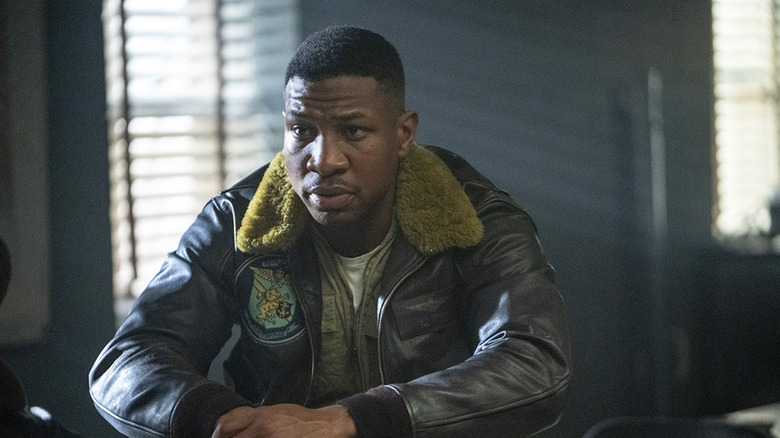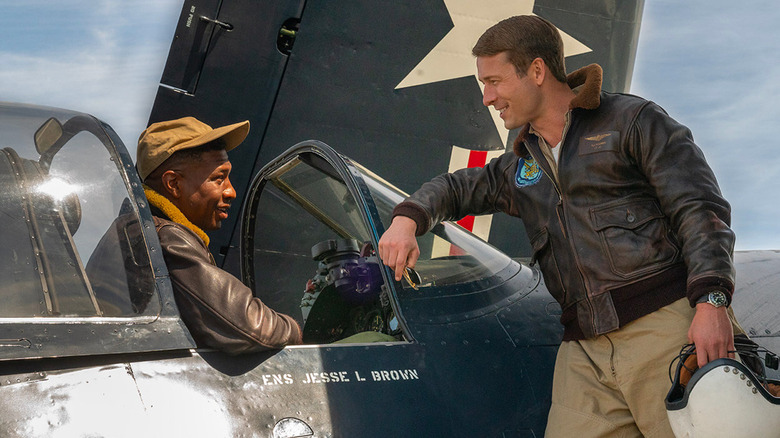Devotion Review: Jonathan Majors And Glen Powell Make A Great Team In This Muddled Korean War Drama [TIFF]
The marketing for "Devotion" is bound to play up the fact that, just like the recent mega-hit "Top Gun: Maverick," this is yet another Navy pilot movie that co-stars Glen Powell. But while that may put butts in seats, it also does a disservice to J. D. Dillard's more intimate war flick. While there are several great IMAX-enhanced moments of aerial combat, "Devotion" is far more interested in what's happening on earth rather than in the sky. It's a character drama with occasional bursts of action, and while there's certainly nothing wrong with that, the film ends up rather muddled. You can see the bones of something greater here, and Dillard remains a filmmaker worth paying attention to. But even at oddly-paced 138 minutes, "Devotion" feels as if it's lacking something — as if entire scenes have been trimmed to get to the flying moments faster.
This is disappointing, because not only is Dillard's direction strong, but he's also working with great leads. Jonathan Majors is a commanding presence as Jesse Brown, who in real life was the first Black man to complete the U.S. Navy's basic flight training program. Powell is Jesse's wingman Tom Hudner, and he delivers a charming performance that pairs well with what Majors is doing.
Since Major's character is the sole Black face among a sea of white pilots, you might think "Devotion" is about a Black man suddenly thrust into a world of white, hostile men who want nothing to do with him, only to then overcome the odds. After all, that's the type of movie Hollywood loves to make. But "Devotion" interestingly sets things up a different way: Jesse is already established as a pilot when we meet him. Instead, it's Powell's Tom who is the new guy who has to win people over. Jesse gives him the cold shoulder at first, but they eventually become good friends, with Tom serving as Jesse's wingman.
But while Jesse's fellow pilots respect him, other men in the Navy look at him with disdain. And those outside the Navy are just as bad — Jesse and his wife Daisy (a warm, delightful Christina Jackson) live next to a scowling white woman who calls the cops on her neighbors for playing records too loud, and a trip to Cannes has Jesse scorned at nearly every turn. This poor treatment of Jesse angers Tom, but Jesse continually keeps his cool. Not because he wants to — but because he has to. He and Tom may both be pilots, but they're from much different worlds. As Jesse explains to Tom after being reprimanded for disobeying a direct order, "A slap on the wrist for me is not the same as a slap on the wrist for me." If Tom makes a mistake, he might be able to skirt by due to the color of his skin. But if Jesse were to screw something up, no matter how minor, it could ruin his entire life.
Something is missing
This is a solid set-up, and the story of Jesse Brown, and his friendship with Tom Hudner, is absolutely worth telling. And yet, "Devotion" continually misses a step from scene to scene. The film is too low-key for its own good, and it never quite establishes emotional stakes. While Majors and Jackson have great chemistry as husband and wife, their love story is underdeveloped, which is all the more frustrating when it's later highlighted as an important element of the film.
On top of that, the cinematography by Erik Messerschmidt is weirdly murky. The outdoor scenes of planes zooming through the sky are well-lit, but anytime a character steps inside, they're shrouded in so much darkness that this might as well be an episode of "Stranger Things." Is this a stylish choice? If so, why? I'm not saying movies can't have dark scenes — everyone reveres the darkness of the late, great cinematographer Gordon Willis — but it comes across as pointless here. To be fair: there's always a chance the theater I saw the film at here at TIFF had poor projection, causing this issue. But I don't think so.
As underwhelming as "Devotion" can be, there are glimpses of the better film underneath. An extended sequence where Jesse, Tom, and their fellow pilots head to a Cannes casino and rub shoulders with Elizabeth Taylor (Serinda Swan) packs a punch because it feels like the sort of thing we don't usually see in a war movie. And a running theme where Jesse repeats the hateful, racist slurs that have been hurled at him all his life to himself while looking in a mirror reveals so much about his character and how his struggles. But then there are other clumsy moments, like when a pilot we barely know dies turning a test flight, and it's treated as this huge, devastating moment, despite any real character connection.
As a fan of Dillard's work, I had high hopes for "Devotion." That it ultimately disappoints does not sway me, though. I remain convinced there's a longer, better cut of this floating around somewhere out there. And I'm also convinced that whatever Dillard does next will be worth seeing. But his "Devotion" never manages to get off the ground. It's not a bad movie, mind you. It just could've been something better.
/Film Rating: 6 out of 10

